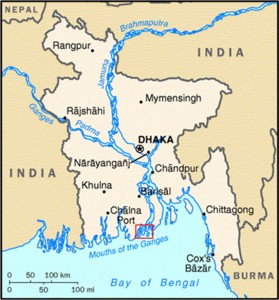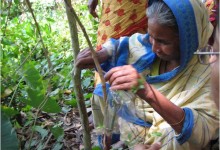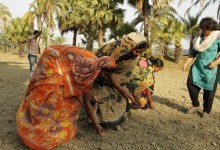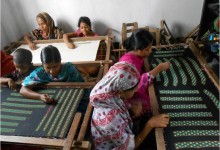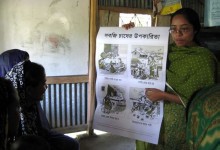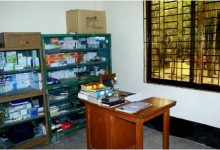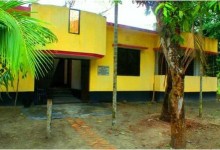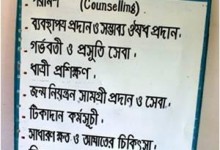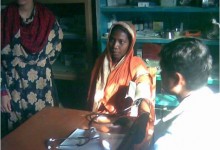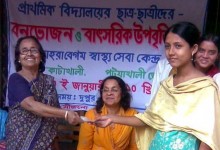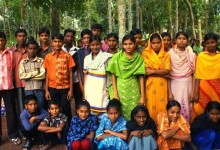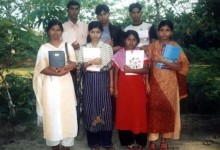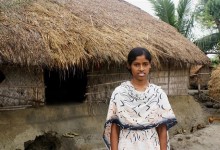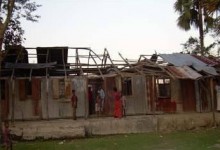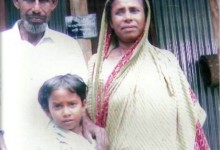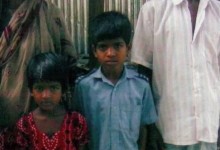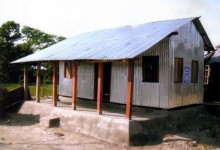Since 2000, Samhati has been working to empower women and families in the remote Katakhali community (a village on an island off the southern coast of Bangladesh, Patuakhali District). Our progress there has been hampered by a succession of cyclones, including cyclone SIDR in November 2007 and cyclone AILA in May 2009, which have been increasingly severe due to climate change.
Katakhali can be reached only by boat, and the journey from Dhaka takes approximately 30 hours. The nearest hospital or health clinic is about a journey of 10 hours away. There was no doctor, nurse, or medical care in the village until the Katakhali Project was commenced. Katakhali has no roads, no electricity lines, no running water or sewers, no cars or even rickshaws. In the last twenty years, the population of the area has greatly increased and the soil has become infertile from repeated cyclones and climate change. There are few opportunities for families to make a living. Women and girls are the worst off. Their life expectancy and literacy rates were shockingly low. They are subjected to domestic violence and have little power over their own lives.
To date, the Katakhali Project has had a tremendous positive impact on the Katakhali women, as well as on their children and the entire village. The women are learning to read and write and to better understand their problems and find solutions. They are now demanding greater rights and insisting on better services from the government. Women are also earning additional money for their families and have gained confidence and mobility. Women are gaining greater decision-making roles within the family and in village governance as well. The education on nutrition and sanitation has transformed the village. Every household in Katakhali now has a sanitary latrine. In 2005, Katakhali was named a “model village” by one of Bangladesh’s prominent newspapers.
In 2017, we expanded the project to include the adjacent village, Modhukhali. A new women’s group has been formed there with literacy classes and income generating support.
TRAININGS AND EMPOWERMENT
Samhati supports adult literacy classes and leadership and skills training to motivated villagers, mostly women. Due to the increasing severity of storms in the area and the other impacts of climate change, the villagers are particularly vulnerable and need retraining and adaptation assistance. New literacy classes, including a more advanced level class, have been started and a library has been established. Training is given on sewing, fabric printing, candle-making, confection making, vegetable gardening, and fish and crab cultivation. Special training was provided on climate-adaptive farming and on starting a coconut nursery to reduce storm erosion. Villagers are producing products and selling them for profit. Local people have been hired as staff and are running the programs themselves. Through this project, hundreds of villagers have learned to read, obtained vocational skills, and been trained on health and hygiene.
HEALTH CENTER
The provision of the medical care has been absolutely essential for improving the health and well-being and morale of this village. In March 2007, the Health Center in Katakhali was inaugurated. The doctor and assistant provide health services from this center. Previously, the health clinic had been operating from a hut made of straw and tin with mud floors. The provision of this concrete and essential service (basic health care) has been one of the keys to the success of the Katakhali Project. The participants in the project have become motivated, involved partners in the transformation of their community.
Samhati’s Health Center (staffed by a doctor and assistant) provides medical services in Katakhali and the entire Barobaishdia Island, serving the approximately 27,000 persons who live on the island and who would otherwise have difficult access to medical care. The health clinic’s doctor is very popular and is a great boost to health and morale in the community. The Heath Center provides services on a sliding scale fee basis. The clinic also provides prenatal and postnatal care and immunizations for pregnant women and children. The care includes infant care, sick visits for children and adults, as well as vaccinations for polio, whooping cough and German measles. The clinic also treats ailments such as diarrhea, hepatitis, respiratory infections, injuries, etc. The clinic is providing preventive health awareness to the community, including education on hygiene, low cost nutritional diet, food safety, and other communicable diseases.The clinic also works with the governmental health department to provide family planning counseling and contraceptives. Free contraceptives are provided by the government once a week at the family planning clinic. Because of the regular vigilance of the village women, the family planning clinic is open on a regular basis. The birth rate in Katakhali village has gone down to approximately two (2) children per female.
The health clinic was instrumental in providing emergency shelter and medical care during and in the aftermath of cyclone SIDR (November 2007), cyclone AILA (May 2009), cyclone Mahasen (2013), and cyclone Foni (2019). The entire Katakhali village takes shelter in the clinic because the cyclone shelter in the community is a little far to walk during an emergency. The doctor and assistant have treated hundreds of people from Katakhali and neighboring villages who had suffered broken limbs and other injuries as the result of the cyclones. Many children and elderly have been treated for diarrhea and infectious diseases as well. Because of the existence of the health clinic, no one in Katakhali perished during the recent cyclones.
The health center now has a small lab and technician to do key diagnostic tests. This has been important to prevent illnesses from going untreated.
The health center has been crucial during the pandemic. Many consultations have been by phone, but patients are also able to visit the out-patient clinic if needed. Covid-19 training was provided to the doctor, along with PPE, two oxygen tanks, pulse oxymeter, and thermal scanner. The oxygen tank has saved the lives of many infants and adults with respiratory issues.
SCHOLARSHIPS
Every year, Samhati supports scholarships of approximately $75 each to 30 needy children in Katakhali so that they can attend middle and high school in Katakhali. From 2020, the scholarship program was expanded to include 20 students in the neighboring island called Ganga Char, a very impoverished community. Now 50 youth receive scholarships annually.
So far, over 100 children have finished high school due to this program. About 30% of the graduates have enrolled in college and the rest are working. This is a tremendous achievement for Katakhali village, which only has approximately 300 families. These children in turn teach their parents, find jobs, and bring about a tangible change in the community. Approximately $75 per student per year ensures that a child can go to school instead of working. Although the government schools do not require tuition, parents have to spend money on books and supplies, exam fees, clothes, and tutoring. Also, putting a child in school means loss of income from the child’s labor. With this small amount of money, the children are able to be fed and clothed and sent to school with the appropriate books and supplies.
A scholarship committee made up of teachers and other community members reviews the candidates and awards scholarships based on a combination of merit and financial need. The scholarship program has been very popular and greatly increased the morale and the chances of a better life for the local children and their families.
In 2018, we started the Jahanara Ali Memorial College Scholarship, providing a college or vocational scholarship to one graduate from each of our programs in Katakhali, Laksmichamp, and Natore. Ashamoni was selected from Katakhali and is attending Patuakhali Mahila College. Samhati provided her a laptop in 2021 so that she could study during the pandemic.
As a result of our scholarships, the rate of attendance at school has increased and a positive educational environment has been created in the village. The children and their families are extremely pleased and have the possibility of a brighter future.
PRESCHOOL AND LIBRARY
In 2013, Samhati started the first pre-school in the community, which employs local women. Approximately two dozen children attend the preschool six morning per week. They play games, sing songs, draw, and receive a healthy snack. Toys and books have been donated to the preschool. Two local women have been hired as preschool teachers. Other local women have been hired to collect and prepare the snacks. The preschool has been a source of huge joy to the children and it also helps them prepare to start regular school.
Samhati is also funding a popular community library, which is in the center of the village, next to the school. Many students go to the library after school to study.
BICYCLES FOR GIRLS
In February 2020, Samhati started giving bikes to girls in Katakhali to increase girls’ mobility, safety, and empowerment. We distributed 10 bicycles in 2020 and another 10 in 2021 in Katakhali/Modhukhali. The project is truly transformative. At first it was hard to find girls interested in learning and now it is hugely popular and girls are riding around. We have also provided helmets to everyone.
COMPUTER TRAINING PROGRAM
In 2021, we inaugurated a new Computer Training Program to help our students continue to learn online. Our classes were hugely popular and many people saw computers for the first time. To encourage attendance and accountability, we charged a nominal fee for the classes, which was used to pay for the instructor and the purchase of a third laptop. Many adult women have also enrolled in the computer classes.
PANDEMIC IMPACT
Due to coronavirus, all government schools, our preschool, and our trainings were shut down for several months, but all our work has now resumed in smaller groups. We provided information to our community members to raise awareness about coronavirus, including wearing masks and social distancing. We hired women to make hundreds of masks for the community.
CLIMATE-ADAPTIVE HOUSING
After cyclones SIDR (2008) and AILA (2009), Samhati built 52 tin and wood houses and deeded them to the female heads of household. With time and the increased rain and storms from climate change, these houses were showing some wear and tear. In 2020, we distributed tin sheets to repair the homes of 31 poor families who sustained damage to their homes from Cyclone Bul Bul (2019) and other storms. The community library and preschool for 25 children were also repaired in 2020 after suffering storm damage.
FUNDING FOR KATAKHALI PROJECT
From 2006 to 2011 Samhati received annual grants from the International Monetary Fund’s Civic Program to partially fund the Katakhali Project. In 2011, we reached our final year of eligibility for the IMF grant. We now rely entirely on individual donations to fund our work.

